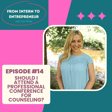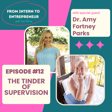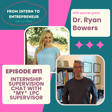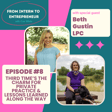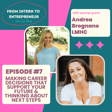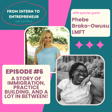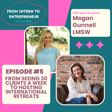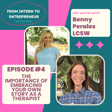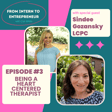
Other Therapists Aren't Your Competitors!
From Intern to Entrepreneur is the podcast for counseling graduate students (and other grad students in mental health fields) to start planning their journey to private practice while they're still in graduate school! Host, Cori White, started planning her journey while she was still in her graduate program and it paid off BIG to start planning EARLY.
In this episode of From Intern to Entrepreneur, Cori interviews Amanda Hunter. Amanda talks about her journey to becoming a therapist, and her decision to open her own private practice and specialize in Perinatal Mental Health.
Amanda owns a practice in Pennsylvania called Everlasting Wellness, a practice that specializes in Perinatal Mental Health. Her practice has multiple locations and she has over 35 therapist working with her!
To learn more about Amanda, visit her website:
https://everlastingwellnesscounseling.com/

